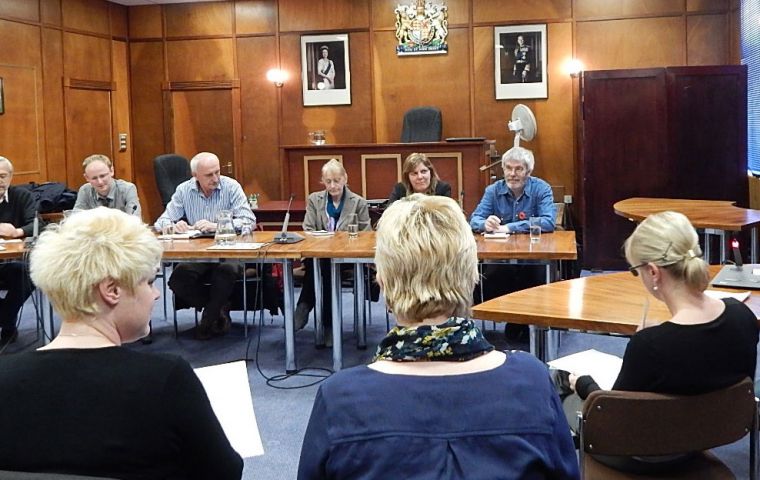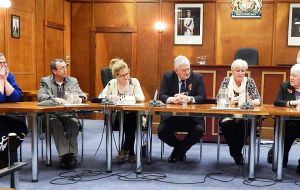MercoPress. South Atlantic News Agency
Falklands General Election: an important choice for a time of change
 Candidates grilled by the local media
Candidates grilled by the local media The constitution of the Falkland Islands requires that a general election be held every four years to choose the eight members of the Islands’ Legislative Assembly or lower house of government. The next General Election is due to be held on November 7th this year.
Once elected, members will choose three of their number to become members of the Executive Council, which is the upper house of the Falkland Islands. While the Executive Council is presided over by a Governor appointed by the British Government and includes a small number of other members such as the Attorney General of the Falkland Islands, the three elected members of the Executive Council drawn from among the elected members of the Legislative Assembly are the only members to have voting rights.
Out of a resident population estimated at 2,931 on the occasion of the last census in April of 2012, there are nearly 2,000 people eligible to vote by reason of their being over the age of 18 and possessing the necessary status. There are two constituencies: Stanley the Islands’ only town, which elects five members of the Legislative Council or MLAs, and the Camp, the Falkland Islands term for anywhere outside of Stanley, which with roughly one fifth of the total eligible voters, elects three MLAs, who need not be resident in “Camp” and with their town colleagues will be expected to represent the interests of the Islands as a whole and not merely their constituents.
There are no political parties and nothing to bar members of one Assembly standing for re-election. In the forthcoming elections, seven of the previous eight MLAs are standing again. They will expect to be judged by the electorate on the basis of their previous performance, while, with the exception of one former MLA, who was not a member of the last Assembly, the other eight fresh and inexperienced candidates hope to be able to convince the electorate that they possess the necessary qualities to make a better job of running the country than their more seasoned competitors.
In this process, without a party political team providing policy, and where there is a high degree of consensus about important issues, perceptions of personality and character can assume great importance. In a society as small as the Falkland Islands, where nearly all the permanent residents are known to each other to some extent and where rumour can sometimes acquire the status of a national sport, standing for public office can be fraught with difficulties not experienced elsewhere. Scottish readers of this piece may be familiar with the expression, “Ah kennt his fayther” (I knew his father) which carries with it the unspoken inference that this knowledge of one generation did not inspire confidence in the next.
For the past couple of weeks, the candidates for election have been submitting themselves to scrutiny by various sectors of the public; there have been televised public meetings, a meeting with the Chamber of Commerce also televised, a recorded press conference and the publication of the candidates’ personal manifestos in the Islands’ newspaper, Penguin News.
What is new about these elections is that for the first time the elected candidates will be paid a salary, rather than expenses and be expected to work full-time, giving up whatever jobs or business interests they may currently hold.
This is a new development, brought about in the hope of a new professionalism from those elected. Also new, is the role that the social media has been playing in bringing candidates together with voters and their concerns in a much more direct and lively fashion than that provided by the rather formulaic, repetitive, stage-managed and, many would claim, simply “boring” public meetings. As might be expected, it was two of the younger candidates, who took advantage of the extremely high use of ‘facebook’ in the Islands and opened discussion sites, onto which they have been followed in some cases by some of their less media-savvy fellow candidates.
If the use of social media in campaigning is a new aspect of this election, so it would seem is the fact that relations with Argentina no longer seem to figure as the main concern of the electorate, who during the public meetings and in the social media have shown themselves to be more concerned with domestic issues such as roads, health, education and, above all, the possible effects on the Islands of a promised future oil bonanza.
With first oil from the Rockhopper discovery expected in 2017 or 2018 and the prospect of further oil exploration there is a growing awareness among Falkland Islanders that if the inevitable changes are not properly managed by the new Legislative Assembly during the next four years, certain cherished aspects of their current life may be swept away. Such considerations make the result of this election more important than usual, but whether the electorate will cling in the main to the known and tried candidates or opt, as they did eight years ago, to embrace change and with it all the new and untried candidates, remains anyone’s guess.
By John Fowler - MercoPress - Stanley





Top Comments
Disclaimer & comment rules-

-

-

Read all commentsThis must be a good time for the Falkland Islands to be truly innovative. Is it really fair to ask 8 people to give up their jobs or businesses for 4 years, with no guarantee that they will be able to acquire new jobs or businesses at the end of their terms? For a total F£160,000. Suggested previously, but what's wrong with an “electronic” Assembly? How much could be achieved with video conferencing, encrypted communications? Take 8 40-foot intermodal containers and modify them as electronic communications units. Truck them to wherever they are needed, lay power cables and a new MLA is ready to go. They may not need to give up jobs or businesses. Just cut back a little. It shouldn't be seen as an excuse to leave MLAs unpaid. In fact, FIG should acquire helicopters and make them available to MLAs as necessary. Real 21st century innovation! And no-one should say that it can't be done. Has anyone ever tried?
Oct 29th, 2013 - 03:22 pm 0Quite a few factual inaccuracies in this.
Oct 29th, 2013 - 04:49 pm 0It's not very clear from the article but I assume that 5 of the MLA's would be from Stanley and 3 from the Camp, but it implies that they don't have to be from the Camp.
Oct 29th, 2013 - 05:03 pm 0Or it may be that all eight could be from Stanley but 3 represent the Camp...which is not quite fair as MLA's from the Camp cannot represent Stanley but MLA's from Stanley can represent the Camp...
Either way it wouldn't be a big problem to lay on a faster mode of transport for the 3 or Hi-tec communications...
BTW....“Ah kennt his fayther” .....East or East Coast Scotland.....hehe or English pretending to be Scots.
West Coast would be.....“Ah mind his fayther”......or negative....“Ah cannae mind his fayther”.
.....just saying....
Commenting for this story is now closed.
If you have a Facebook account, become a fan and comment on our Facebook Page!